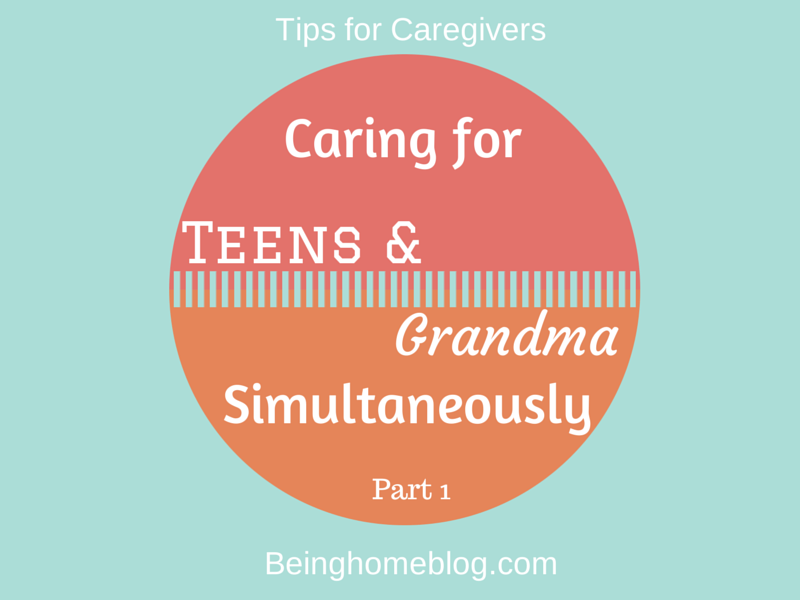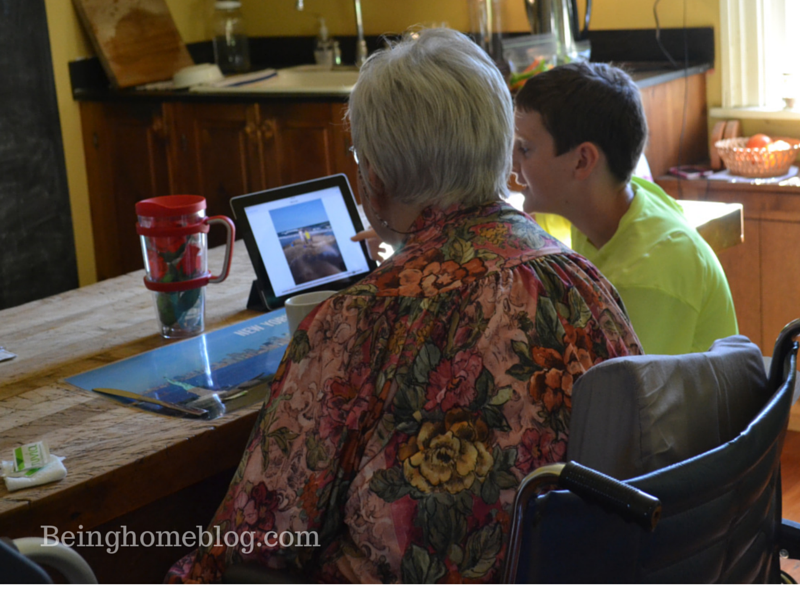
An estimated one out of every eight Americans aged 40-60 are caring for an aging family member while still raising children. Chances are the children of this “sandwich generation” are teenagers or close to that age range.
Three Generations Under One Roof
When neighbors and friends hear that I’m taking care of my aunt, their response is always supportive and encouraging. Most say what a blessing it is for the kids to have the example and unique opportunity to help someone they love that’s out of the ordinary. They say things like “they’ll remember this when they get older” or “they’ll always appreciate this experience”.
While all of these comments are well-meaning and hold some truth, they only acknowledge one side of the picture.
Everyone recognizes my sacrifice since I’m providing most of the hands-on care but most people don’t consider the major sacrifice my husband and children have made.
Below are some of the realities of our new life and how it affects the kids. My intention isn’t to complain, but to help others anticipate some issues to help better prepare for caring for an elderly family member while still caring for children at home.
Two generations that are high-maintenance
I know my children will benefit from this experience but I don’t take that for granted. Teenagers can be more needy than younger children. It’s a notoriously emotionally-charged time with increasing demands at school and in their world.
I minimally prepared my own children for the change due to my aunt’s unexpected fall. I tried to keep them informed of the progress and timeline of my aunt’s arrival but they really had no input into the decision and in many ways, it turned their lives upside-down. Some of those changes have been drastic, others have been subtle.
We all knew the kids would have to shuffle room assignments but it was impossible to anticipate some of the other changes and demands on their time and privacy. Both of which are in high demand during the teen years.
Unexpected Responsibilities
I rely on all of the kids to keep my aunt company if I have to run an errand, make dinner or do work around the house. When this one or that one has a long day at school and just wants to retreat to their room, sometimes they really don’t have that luxury.

We set up my aunt’s room to include a sitting area with a TV and I really expected her to be in there all the time. In her former life, she sat at the same table all day and watched her shows. Since coming to live with us, however, she prefers to be where the action is with the family. I think it’s great and a major factor in her improved overall health but it also puts a constant demand on our attention. It’s an unexpected reality of our new life together.
Although this is her home, my aunt’s mobility and cognition is limited so her choices of things to do to occupy herself is also limited. She’s only entertained by 3 shows (which we record for her) and EWTN. The kids are so sweet that they also limit their show selections to her favorites when she’s in the main living area. My aunt doesn’t demand it and tries hard not to interfere with their leisure time but they want to make her feel comfortable.
When the kids disappear into their rooms for long stretches of time, I let them. Luckily, there are enough of us to pick up where someone else left off and my aunt has nearly constant company after school and on the weekends. Giving them some space in this demanding situation is the least I can do.
Inevitable consequences of caretaking
Maybe it’s not a change but since I’m getting up through the night and my introverted self is primarily responsible for providing companionship for my aunt throughout a majority of the day, some days I reserve my patience for my aunt and there’s very little left over for the kids. I have a lot less tolerance for their dependence and I’m a bear if I don’t get enough sleep. You get the picture. In spite of my sometimes shorter fuse, the kids have all been very accommodating and understanding and truly forgive me for snapping at them on days when I’m particularly tired.
Suspended traditions
Our holidays will look drastically different. For one, the piano we got for my aunt is sitting in the only space for a Christmas tree. I have no idea where we’ll squeeze one in, but we will. I’m hanging on to a few abbreviated traditions but some will have to be suspended.
I usually host Thanksgiving and Christmas dinner for my parents and anyone else who doesn’t have plans but this year I won’t be able to. Luckily, my children are used to me cutting some of the clutter of the holidays but meals have never been considered clutter.
The only thing I can really do is talk to them about what the holidays might look like and ask what parts are most important to them. I’m sure I can’t accommodate all of their preferences but we can probably preserve a few.
The ultimate test of patience and selflessness
Finally, the kids have been so patient and sweet about repeating things that my aunt forgets due to her short-term memory loss. This is another minor thing but when it’s compounded with all the demands on their time and attention and the tsunami of change in their lives, both inside and outside of the home, it could potentially add to their stress. So far, no one has expressed anything but compassion and sometimes amusement when she asks something repeatedly. She really is so sweet that it’s nearly impossible to get frustrated with her.
Overall, my children have really risen to the occasion and have been patient and compassionate to a person who has loved them for their entire lives. The ways in which my children have served my aunt are humbling. I’m so proud of how they’ve handled everything from my limited availability to the physical changes to our environment.
They’ve been forced out of their bubbles of teen-ager-ness. Their reaction to the situation and the needs of an emotionally, physically and cognitively vulnerable person is an indication of their character. I still think it’s important to acknowledge the stress and to keep talking about it openly in order to identify times when it’s overwhelming and to find creative ways to relieve the stress for them. I’m sure I’ve missed opportunities to reassure them but I’ll just keep trying.
They get an unusual extension of grace from me. If our family wasn’t in this role, I’d have a lot less tolerance for their moody, self-oriented selves when it’s directed at me or each other. But I’m not lumping that on to their plates because they’ve shown over and over that they aren’t only thinking of themselves.
In the next post in this mini-series, I’ll share the very best piece of advice I received about caring for the kids when I was about to bring my aunt home.




